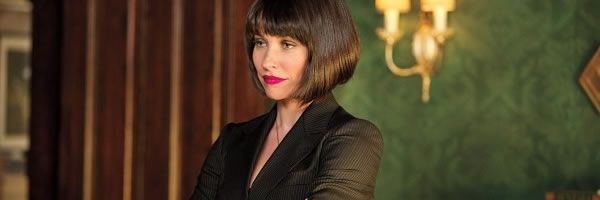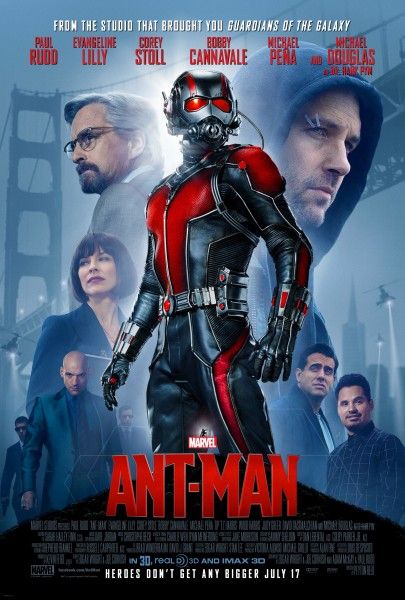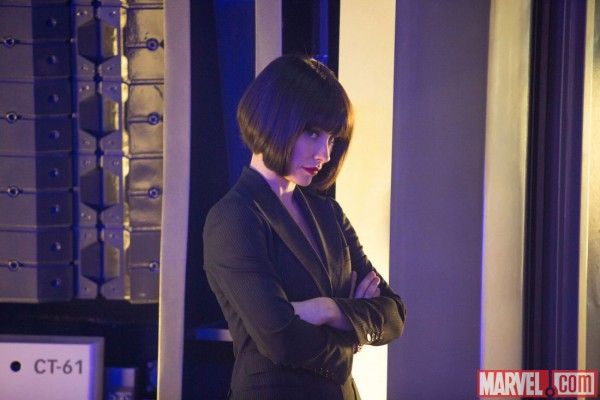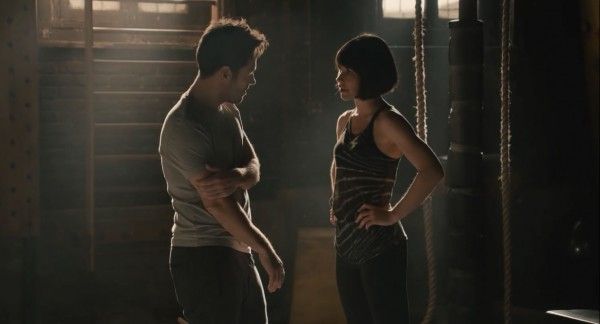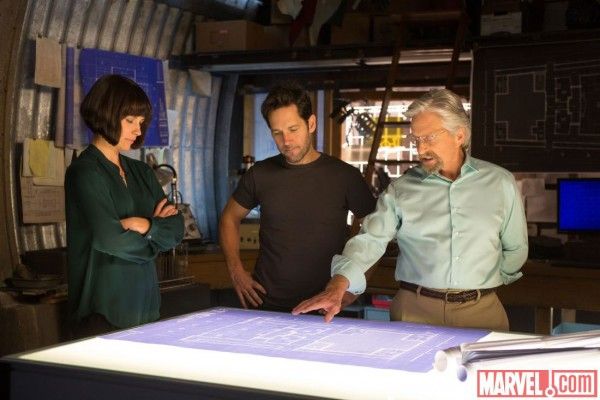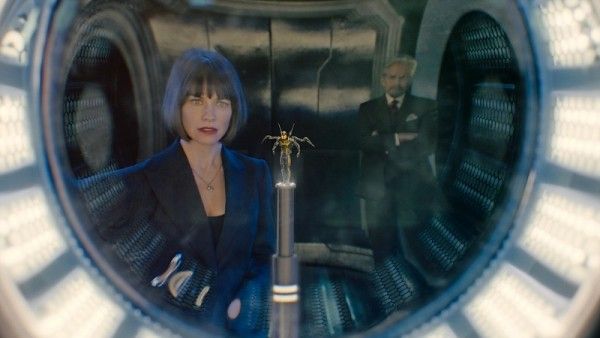Evangeline Lilly is no stranger to action roles. She broke through playing Kate Austen on Lost and has gone on to appear in blockbuster films like Real Steel and The Hobbit, and now she’s come over to the Marvel Cinematic Universe for the launch of a new superhero origin film, Ant-Man. In the movie, she plays Hank Pym’s daughter, Hope Van Dyne (comic films will recognize that she’s taken the last name of her mother, Janet Van Dyne), which should tell you how the character feels towards her father.
Last year, other movie journalists and I got to visit the set of Ant-Man and talk to Lilly about the film. She explained that her role had been beefed up from Edgar Wright’s original script and taken her from a supporting character to one who was on equal footing with Hank Pym (Michael Douglas) and Scott Lang (Paul Rudd). She also talked about her character’s emotional ambiguity, joining the MCU, the film’s father-daughter relationship, and much more. Check out the full interview below.
It sounds like Hope has a negative history with Hank.
EVANGELINE LILLY: That's true. That is true. Hope and her father don't get along very well, and haven't for many, many years -- kind of for most of her life. They've been sort of thrust together because of circumstances right now, but it doesn't mean that they like it. It doesn't mean that she likes it.
Peyton told us this is as much Hope's movie as Scott's movie. Can you elaborate on what that means?
LILLY: I'm only in three pages of the script, so I don't really know what he's talking about. [laughter] I'm lucky enough to have gotten involved with the film when they were still rewriting it from the original Edgar Wright draft. I met with Paul Rudd in New York City before they really came out with the official new draft. I got a chance to sort of say, 'Hey, why don't you beef up my character and give her a really full arc?' I think one of the things that is easy to have happened in a superhero story is that the female character, whether she be a heroine or not, can often be the wart on the man. She's just his accompaniment, she's just there when he's there, and there's no real arc or story for her.
There is such an appetite in the comic world from fans to see fully realized, full developed female characters, and Marvel are very supportive in that. All the suggestions that I put forward and the things that I would ask for, like, 'What about this?' or 'We can do this with her,' they were very amenable to it and they were very open to it. And then they would take it even farther. They would go away, and they could come back to me and say, 'Oh, we've really done something incredible with Hope.'
I kind of got lucky. I started out thinking I was walking into a film playing a supporting character. It's now become a trifecta with myself and Michael Douglas and Paul Rudd. I'm not going to turn my nose up at that.
Hope seems like she's stuck between her father and the man that he mentored. Is that dynamic difficult to manage?
LILLY: Yeah it is actually. It's a very astute question, because I just finished talking to Corey about that very thing. This is sort of a new section of filming, us being at Pym Tech. I've spent a lot of time up until now filming primarily the dynamic between Hank, Scott and Hope. Now having it be Hank, Hope and Darren and playing this dynamic, I'm still kind of trying to find my feet. It is a bit complicated and a bit confusing on so many levels. They're very complicated relationships, as most father/daughter relationships are. There's no easy answers.
Do you work for Pym Tech? Where do you start off in the story?
LILLY: You're under embargo, so I'm just going so answer the question. I don't know what I'm allowed to say. I do work for Pym Tech, and am a fairly senior level scientist at the company. I have a lot of power in the company; I'm one of the board members, I'm also the daughter of the man who created the company, which helps. In her own right, she's become a very capable, very intelligent young woman, so she very much stands on her own feet in the company. I mean, Hank hasn't been around in a long time.
How does Hope feel about the idea of Scott Lang coming into their eyes, and the Ant-Man suit being passed to someone else?
LILLY: She hates it. [laughs] It's actually become a difficult question to address in the script. Why isn't Hope Ant-Man? In a day and age when Ant-Man was first invented, it would have made sense. Why would he hand it off to his daughter? That wouldn't make any sense at all. But in 2014, why wouldn't he hand it off to his daughter, especially a daughter as intelligent and capable as Hope? Of course we answer all those questions, but I can't tell you how or why.
What relationship do you have with your mother?
LILLY: When we begin the film, Janet Van Dyne is not alive. She's lost her mother. That marks the character in a way that affects everything she does. Her mother has become a figure in her mind more than a human being, and I think that she has always suffered from that loss and not having that presence, that female figure in her life.
Does Hope share Hank's animosity toward superhero?
LILLY: No. In fact, I think she doesn't understand her father's animosity towards superheroes in that way, and I think for the most part that's because she really doesn't understand any of what really happened in her life. A lot of stuff has been kept from her, so she's in the dark. I think that results in a lot of bitterness and confusion about her father's behavior.
Hope took her mother's name but works at her father's company. Is this her way of taking her mother's legacy and using it to correct her father's in her mind?
LILLY: It is so multilayered. When you finish watching this movie, you could dissect that question 20 times over and have 20 different answers for it, and I love that. I love the multi-dimensions of Hope Van Dyne because what motivates her to do all of the things she does in the film -- and even in the backstory that you realize as you're walking into the film -- there's no clear-cut answer. She's angry and hurting and has made a lot of decisions based out of that anger.
What has it been like working with Michael?
LILLY: I distinctly remember the day, the scene, I was working when it hit me I was working with Michael Douglas. Up until that point I hadn't given it any thought. I was like, yeah, OK, great cast, looks good, let's do the movie. I started working without really thinking about it. Then I had to do a fairly intense actor scene. Superhero movies don't often have a lot of actors' scenes. He had to bring it and I had to bring it, and somewhere in the middle of that scene the penny dropped, and I went, 'Holy fuck, I'm working with Michael Douglas!'
From the minute he steps on set, he brings an energy into the world that puts you in your place. I don't mean that in a negative way; I mean that in the most incredible way, like you are immediately transported into the world that you're supposed to be performing in instead of this world, because he goes there, and he goes there 100 percent. I think at this point in his career it would be very easy for a man like Michael Douglas to dial it in on a film like this and just go, 'Eh, it's a paycheck. Just come get my job over and done with and get out.' But when they roll those cameras -- even when they're not rolling, and they just call for us to rehearse -- he really brings it. He opens his mouth and you go, 'Oh that's how it's done. That's what we're supposed to be doing.'
Do you get to do any physical stuff?
LILLY: She gets some physical stuff. She didn't originally. That was one of the additions that came through me making suggestions and Marvel coming back and saying, 'Wait till you see what we did.' [laughs] They've made her a pretty physically capable character. As much as Hope Van Dyne at some point in this movie would probably like to have a shot at Yellowjacket, she doesn't get it.
What are her thoughts on Darren, if she's not crazy about Hank and she's not crazy about Scott?
LILLY: [laughs] She's not crazy about anybody, is she? She's just a bitch. She's kind of horrible. I'm not exaggerating, there was a point when we were filming that I turned to Peyton and I was like, 'Peyton, do I ever get to play a color other than dour? I would really like to smile for once.' [laughter] She is sort of an island unto herself in this film, and what I love about that is you're never completely sure where her alliances are because she doesn't seem to like anybody. It makes for a wonderful ambiguity in the character that I have a great time playing, and I love the idea that you might walk away from this film and still, at the end of the film, go, 'Wait, is she good or is she bad? I'm not totally clear.
That's what the sequel's for.
LILLY: Yeah.
Peyton mentioned you had a lot of question about the science of Ant-Man. Can you elaborate on that?
LILLY: I just really like ants, and I really like science. I like quantum physics a lot. I was interested and curious about the quantum world and the physics behind how it all works. [laughs] Not like actually sitting me down and teaching me the physics. I think the thing that got me most excited about the film was when I came for a screen test before I started shooting, they showed us some special effects, pre-vis videos, and I got really excited because they showed us the stuff with the ants. For me, that's the coolest part of this film. You could take all of us out of the movie, and it would still be really kick ass if you had the ants. They're really the best part of the movie.
Had you seen any of the other Marvel movies?
LILLY: I had seen one of them, 'Iron Man 1,' way back in the day. I had to even go back and rewatch that one. I really had to do my research, because initially I was like [makes snorting noise]. 'Marvel.' [laughs] I kind of didn't realize they were making outstanding films. I assumed they were making popcorn-chewing films, and therefore they were filling theaters, which didn't give them a lot of credit in my mind because to me that's a very different art and craft than creating a great film. I went back and started rewatching and went, 'Oh, wait a minute, wow. These guys actually know what they're doing. They're making good movies.'
One of the ones that impressed me the most was the recent 'Captain America' film ['The Winter Soldier'] because they addressed such incredibly topical political shit. I was going, are they getting knocks on the door from the FBI? 'You've got to quit it with that stuff! You're poisoning the minds of young Americans!' I was really impressed by that. I was a political science major, so I love that they politicize their films and they have something to say. They don't just entertain us.
What are they saying with this film?
LILLY: Well, I think this film is more focused on emotion than politics because it is so focused on father/daughter relationships. There of course are political messages in the film, and I think the main one is, 'Is there such a thing as absolute power that is non-corruptible?' And of course the answer is no, there isn't, and therefore absolute power is nothing but terrifying and dangerous. We explore the idea of 'can't you put power in the hands of good people and then it's OK?' I think in the film the message is, 'No, actually, there's no such thing as a totally good person.' There is a little bit of evil in all of us, and it's very easy to draw that out.
Did any of the other films inform how you wanted to beef up your character?
LILLY: No, I think it just came out of I really love story. I actually write as a passion, as something I actually am more passionate about than acting. Really for me it came from looking at the story and looking at her arc and seeing it's missing a lot of elements. It didn't really come from another character or another film. It was just, when I read a character, I need to get excited about playing her. If in any way there's anything sort of boring about playing her, I can't waste my time. Life's too short.
I wanted to get excited about her. There were just elements about Hope originally that were undefined. I had a lot of questions about her relationship with her father. When you walk into the film, why are they where they are in that exact moment? What is the history? What happened to lead to that moment? When you start asking those questions, you have to create those answers. It just suddenly fills in the character in the present. It just suddenly opens up so many more story points for the character in the present.
Was there anything specific that nailed the character for you?
LILLY: I liked that she was mysterious. I really pushed the envelope on the ambiguity on whether she's good or evil. I like that ambiguity. I think it's so much more interesting to play than an overtly good or an overtly evil person.
When you do get into the action, is it more physical and real world or more green screen?
LILLY: For the most part for me it's all been very real, very physical. Human beings, not tennis balls. Sets, not green screens -- which is a blessing. I've done so much acting in my career with green screens, starting with the Smoke Monster and screaming in terror from something that's not there, to 'Real Steel' with the robots, to 'The Hobbit,' to this. I like fantasy. I like worlds where sometimes you need the special effects to make it come alive, but it's not so fun acting it. But this film's been great. I've yet to do a scene really where I can't see what's going on.
Has Marvel given you any idea how Hope might fit in to the larger Marvel universe?
LILLY: Well they always make you sign multi-picture deals, and that always gives you an idea. I know that, for example, Hank Pym and Janet Van Dyne were the founding members of the Avengers. They created the name, they got the people together; that was their baby. So I'm assuming Ant-Man is going to show up in a Marvel movie along the way. Does that mean Hope will? Not necessarily. Maybe. I think the 'Avengers' films are great, they're such a ride, and the universe of Marvel.
My introduction into this world was Comic-Con 2014 where I was ushered into a room, and in this room there were 200 people, and 50 percent of them were megastars, total rockstars in the world today because they play either Captain America or the Hulk or one of these myriad of characters. I really had to take a step back and go, 'What have I walked into? What is this place? It's wild, and there's all these crazy rockstars walking around -- who are all older than me, which was really weird. I was like, 'I feel too old to be in a superhero movie,' and they're like 10 years older than me.
Do you think Hope could take out the Black Widow?
LILLY: No, but it would be a really sexy fight.
Would you have any interest in joining the TV shows?
LILLY: Are they doing TV shows? Oh god. I have sworn off television. Never say never, but it's too much of a grind. I don't know who wants to work that hard. Maybe one episode.
How much romance is in this movie?
LILLY: Not a ton. No triangle! ... kind of. It's pretty ambiguous. I think any time you put a female in a film there's going to be some level of romance. It's the same like life, you put a man and a woman in a room, and somewhere something's going to bubble to the surface, generally speaking. But it's not really a big thing in this film. It's not really a focus. You have to watch the film to find out exactly how.
What's it like working with Paul?
LILLY: Well as you can imagine, Paul's an asshole. [laughter] Horrible. I took this job primarily because Paul Rudd was in this movie. He was on my short list of actors I wanted to work with, and I think one of the main reasons was I thought it would be so much fun, he'd be such a nice guy to work with, and he is. I mean, it does him a disservice to just talk about how nice he is. I think it's really obvious. I think what maybe gets taken for granted is what a great actor he is. Because of his work in the comedy genre, people often forget what a consummate independent actor he is, some of the more meaningful films he's done and how good he is at it.
I was excited to work with him on all levels, and there has been zero disappointment. He is both kind and incredibly talented -- and, turns out, he's a great writer. He's writing on this film, and he's a really good writer. The thing is, I told him, this has been a great test for me. Now I know I can never work in a comedy because I can't keep a goddamn straight face. He makes me crack up in the middle of takes all the time, and then I get all embarrassed I'm blowing take after take after take because I can't stop laughing. It's a great way to spend your day.
By the end of the movie, have Hope's thoughts on superheroes or interest wanting to take up the suit changed?
LILLY: Almost everything about the way she thought at the beginning of the film has changed by the end of the film. She goes through an incredible arc. She has to face a lot of her demons, and she goes through that experience with Hank and Scott, two guys who she's not really keen on, which makes for great, great scenes. She's a changed woman by the end of the woman, but she's still dour. She's still horrible. [laughs]
Did you get to play scenes with the ants?
LILLY: I have the best ant scene in the film, and you can quote me on it.
What is it like working with Peyton?
LILLY: Peyton has been a pleasant surprise, because I didn't know anything about him when we first started. It was sort of similar to how it was with Marvel. I very quickly started watching movies. I rented like six movies from iTunes and sat down and watched them all in a weekend to try to catch up on Peyton and what he does. But I think nothing gave him more clout and more credit than when we were on the Comic-Con panel together and he was announced, and Kevin Feige says, 'And for those of you who don't know, this is Peyton's 20th anniversary Comic-Con.' Twenty years he had been going to Comic-Con religiously. And then they showed this cover of a Comic-Con book that he had sketched when he was a young man and he was in a punk band and he was a drummer, and he drew himself as Ant-Man playing a tiny little set of drums. He is a die hard 'Ant-Man' guy.
I was still like, OK, you're qualified. I still don't know if you'll be fun to work with or you're any good. And we got to set and started working, and we had this big dinner with all the bigwigs in the film, and he walked into the dinner late and the only free chair was beside me. He sat down beside me, and I remember distinctly thinking, 'Ah, I'm really glad Peyton's sitting beside me, because I really like this guy. Oh! I really like this guy!' I kind of realized it's come around. I had to take some time to figure him out. He's wonderful to work with. He's very fun, he's very collaborative, he's very smart and very funny. I like to be around people who make me laugh. It's one of my favorite things on a set. I hate it when people take themselves serious in a film set. I mean, guys, really, we're not curing cancer. We all know that, but we still act like it all the time.
Was Janet Van Dyne's comic book character an influence for you?
LILLY: No, it wasn't. I am still trying to figure out how to get my hands on original 'Ant-Man' comics, where you get them. I've been given a couple recent 'Ant-Man' comics. No offense Marvel, but they are total crap. I really want to read the original ones, because I got through two and I was like, dude, you can't force-feed me another one of these magazines. It was terrible. But Janet's not in them, and neither is Hank and neither is Scott. It's just a completely different fabrication. So if anybody has any old 'Ant-Man' comics they want to lend me...
Ant-Man opens July 17th. For more of our set visit coverage, click on the links below:

